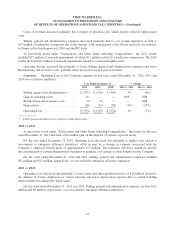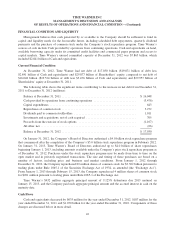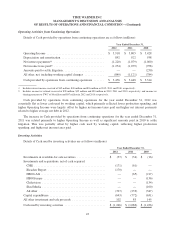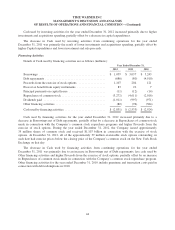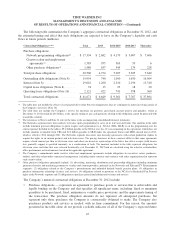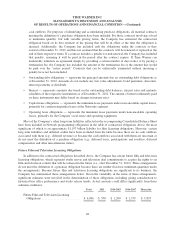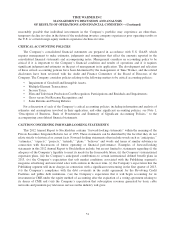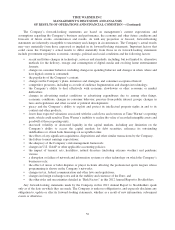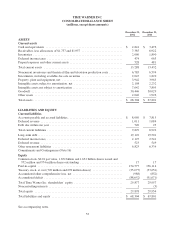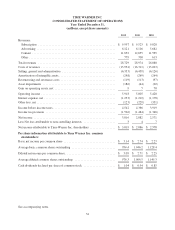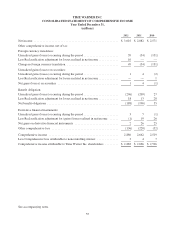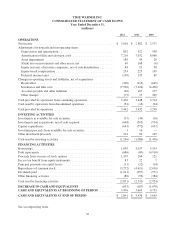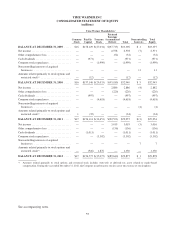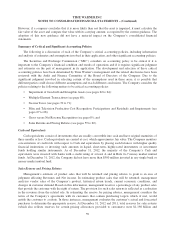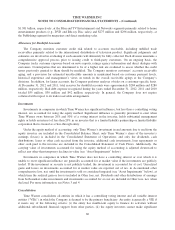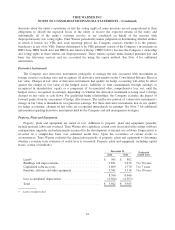Time Magazine 2012 Annual Report Download - page 67
Download and view the complete annual report
Please find page 67 of the 2012 Time Magazine annual report below. You can navigate through the pages in the report by either clicking on the pages listed below, or by using the keyword search tool below to find specific information within the annual report.TIME WARNER INC.
MANAGEMENT’S DISCUSSION AND ANALYSIS
OF RESULTS OF OPERATIONS AND FINANCIAL CONDITION – (Continued)
reasonably possible that individual investments in the Company’s portfolio may experience an other-than-
temporary decline in value in the future if the underlying investee company experiences poor operating results or
the U.S. or certain foreign equity markets experience declines in value.
CRITICAL ACCOUNTING POLICIES
The Company’s consolidated financial statements are prepared in accordance with U.S. GAAP, which
requires management to make estimates, judgments and assumptions that affect the amounts reported in the
consolidated financial statements and accompanying notes. Management considers an accounting policy to be
critical if it is important to the Company’s financial condition and results of operations and if it requires
significant judgment and estimates on the part of management in its application. The development and selection
of these critical accounting policies have been determined by the management of Time Warner, and the related
disclosures have been reviewed with the Audit and Finance Committee of the Board of Directors of the
Company. The Company considers policies relating to the following matters to be critical accounting policies:
• Impairment of Goodwill and Intangible Assets;
• Multiple-Element Transactions;
• Income Taxes;
• Film and Television Production Cost Recognition, Participations and Residuals and Impairments;
• Gross versus Net Revenue Recognition; and
• Sales Returns and Pricing Rebates.
For a discussion of each of the Company’s critical accounting policies, including information and analysis of
estimates and assumptions involved in their application, and other significant accounting policies, see Note 1,
“Description of Business, Basis of Presentation and Summary of Significant Accounting Policies,” to the
accompanying consolidated financial statements.
CAUTION CONCERNING FORWARD-LOOKING STATEMENTS
This 2012 Annual Report to Stockholders contains “forward-looking statements” within the meaning of the
Private Securities Litigation Reform Act of 1995. These statements can be identified by the fact that they do not
relate strictly to historical or current facts. Forward-looking statements often include words such as “anticipates,”
“estimates,” “expects,” “projects,” “intends,” “plans,” “believes” and words and terms of similar substance in
connection with discussions of future operating or financial performance. Examples of forward-looking
statements in this 2012 Annual Report to Stockholders include, but are not limited to, statements regarding (i) the
adequacy of the Company’s liquidity to meet its needs for the foreseeable future, (ii) the Company’s international
expansion plans, (iii) the Company’s anticipated contributions to certain international defined benefit plans in
2013, (iv) the Company’s expectation that soft market conditions associated with the Publishing segment’s
magazine advertising and newsstand sales will continue in the near term, (v) the Company’s expectation that the
Publishing segment will incur charges in connection with a significant restructuring in the first quarter of 2013,
(vi) the Company’s compliance with the debt covenants in the credit agreement for the Revolving Credit
Facilities and public debt indentures, (vii) the Company’s expectation that it will begin accounting for its
investment in CME under the equity method of accounting after the expiration of a voting agreement relating to
its shares of CME and (viii) the Company’s expectation that subscription revenues generated by basic cable
networks and premium pay television services in the industry will grow.
51


